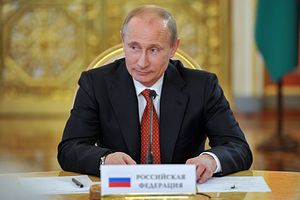On October 15, Russian President Vladimir Putin made a state visit to Kazakhstan to discuss a wide range of issues including economics, energy, regional security and international crises in Ukraine and Syria. According to TASS, the meeting between Putin and Kazakh President Nursultan Nazarbayev was the 13th between the two this year.
In a joint press statement, the two leaders emphasized the close ties between their countries, pointing to the Eurasian Economic Union as a vehicle for their cooperation in the economic realm. After months of economic hardships–due to a collapsed ruble and low oil prices–both sides optimistically highlighted several areas of economic cooperation. These included thousands of cross-border business ventures in oil and gas as well as assembly plants making locomotives and – they plan – helicopters.
“Despite the complicated external conditions, the drop in the price of our main export items and the fluctuation of currency exchange rates, we have nevertheless managed to retain the high intensity of trade and economic relations,” Putin said.
As if it needed to be said again, after 13 meetings this year, Nazarbayev, according to RFE/RL, said “Kazakhstan has been, continues to be, and will remain the closest and most reliable neighbor and ally of Russia.”
Putin called the bilateral relationship “a true allied relationship in every sense of the word.”
Among the agreements signed during the visit was a document relating to the Caspian Sea and an agreement on cooperation in missile launches. With regard to the Caspian–the status of which remains a topic of ongoing discussion between the five littoral states–Russia and Kazakhstan have agreed on amendments to an existing agreement on delimitation of the northern Caspian’s floor.
“We have great plans for joint oil production in the Caspian Sea,” Putin said. He continued, saying that the amendments would “allow companies from both countries to launch the development of the major Struktura Tsentralnaya oil field.”
According to Trend, citing RIA Novosti reports, Putin and Nazarbayev also signed off on a cooperation agreement relating to missile launches from the Russian airbase at Dombarovsky. Given the airbase’s location near the border, the agreement will permit Russia to use “a land plot on the territory of Kazakhstan as an area for falling parts.” Originally built as an ICBM base, Dombarovsky has been adapted for commercial satellite launches as well.
Nazarbayev, who hosted Ukrainian President Petro Poroshenko last week, continued in his expert balancing act. While the meat of the discussion between Putin and Nazarbayev occurred behind closed doors, it’s safe to say Ukraine was discussed. In their joint press statement, Nazarbayev reiterated his stance about the “implementation of the Minsk agreements”
Putin didn’t directly mention Ukraine in the joint press statement, instead highlighting Syria. The Russian leader said he briefed Nazarbayev on “the main results of the Normandy Four meeting in Paris and on the development of the situation in Syria and our actions to suppress terrorist activities in that country.” Kazakhstan has hosted two rounds of negotiations among Syrian rebel groups, although neither led to a substantive breakthrough. Last week Russia launched cruise missiles at targets in Syria from ships in the southern part of the Caspian, a show of force that at least in effect, though perhaps not intent, could be seen as intimidating by other Caspian states.
With regard to the Central Asian region, both Nazarbayev and Putin expressed concern about Tajikistan and the deterioration of security in northern Afghanistan. Nazarbayev floated an idea for a forum, “Islam Against Terrorism,” which Putin endorsed. But as of yet, it’s unclear what Nazarbayev really has in mind.

































